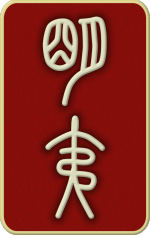
明夷 Míng yí Overshadowing (Darkening) [hexagram 36]


Earth over Fire
 Earth element
Earth element
Lunar month: 9 ; Host (controlling) line : 5
The Decision
Overshadowing – in hardship best to remain steadfast.
Fiery light buried beneath earth denotes ‘Overshadowing’. Inward brightness, outward yielding – King Wen experiencing difficulties. ‘In hardship best to remain steadfast’ – hiding brilliance. Ji Zi* amidst adversities stayed true to his objectives.
* A semi-legendary sage king from the end of the Shang dynasty c.1000BCE.
明夷: 利艰贞. Míng yí: lì jiān zhēn.
彖传: 明入地中, 明夷. 内文明而外柔顺, 以蒙大难, 文王以之. 利艰贞, 晦其明也, 内难而能正其志, 箕子以之. Tuàn zhuàn: Míng rù dì zhōng, míng yí. Nèi wén míng ér wài róu shùn, yǐ méng dà nàn, wén wàng yǐ zhī. Lì jiān zhēn, huì qímíng yě, nèi nán ér néng zhèng qí zhì, jī zǐ yǐ zhī.
The Image
Earth over fiery sun form ‘Overshadowing’. The wise apply this to dealing with people – brilliance is kept veiled.
象传: 明入地中, 明夷; 君子以莅众, 用晦而明. Xiàng zhuàn: Míng rù dì zhōng, míng yí; jūn zǐ yǐ lì zhòng, yòng huì érmíng.
Line Change 1
Overshadowed by a flying bird, lowering its wings. The wise when traveling do not eat for three days. Whatever the destination people may spread ill rumors.
‘The wise when traveling’ – there is reason not to eat.
初九: 明夷于飞, 垂其翼. 君子于行, 三日不食, 有攸往, 主人有言. Chū jiǔ: míng yí yú fēi, chuí qí yì. Jūn zǐ yú xíng, sān rì bù shí, yǒu yōu wǎng, zhǔ rén yǒu yán.
象传: 君子于行, 义不食也. Xiàng zhuàn: Jūn zǐ yú xíng, yì bù shí yě.
Line Change 2
Overshadowing – wounded in the left thigh. Relying on help from a powerful horse. Fortunate.
‘Fortunate’ because acting appropriately for the circumstances.
六二: 明夷, 夷于左股, 用拯马壮, 吉. Liù èr: míng yí, yí yú zuǒ gǔ, yòng zhěng mǎ zhuàng, jí.
象传: 六二之吉, 顺以则也. Xiàng zhuàn: Liù èr zhī jí, shùn yǐ zé yě.
Line Change 3
Overshadowed while hunting in the south and capturing the opponent’s leader. No need for a hasty resolution.
‘Hunting in the south’ – accomplishing great things.
九三: 明夷于南狩, 得其大首, 不可疾贞. Jiǔ sān: míng yí yú nán shòu, dé qí dà shǒu, bù kě jí zhēn.
象传: 南狩之志, 乃大得也. Xiàng zhuàn: Nán shòu zhī zhì, nǎi dà dé yě.
Line Change 4
Penetrated through the left side of the belly. Understanding the reason for the overshadowing before exiting through the main gate.
‘Penetrated through the left side of the belly’ – carrying out inner intent.
六四: 入于左腹, 获明夷之心, 出于门庭. Liù sì: rù yú zuǒ fù, huò míng yí zhī xīn, chū yú mén tíng.
象传: 入于左腹, 获心意也. Xiàng zhuàn: Rù yú zuǒ fù, huò xīn yì yě.
Line Change 5
Ji Zi submits to the overshadowing. If remain steadfast all will be well.
The steadfastness of Ji Zi did not permit his brilliance to be extinguished.
六五: 箕子之明夷, 利贞. Liù wǔ: jī zǐ zhī míng yí, lì zhēn.
象传: 箕子之贞, 明不可息也. Xiàng zhuàn: Jī zǐ zhī zhēn, míng bù kě xī yě.
Line Change 6
In place of light, darkness. At first ascending to the heavens but then plunging back to earth.
‘At first ascending to the heavens’ – enlightening the whole world. ‘But then plunging back to earth’ – failing to follow the ordained way.
上六: 不明晦, 初登于天, 后入于地. Shàng liù: bù míng huì, chū dēng yú tiān, hòu rù yú dì.
象传: 初登于天, 照四国也. 后入于地, 失则也. Xiàng zhuàn: Chū dēng yú tiān, zhào sì guó yě. Hòu rù yú dì, shī zé yě.
The full set of 64 English translations is available in our new book 'Book of Changes - Deciphered' ➚.